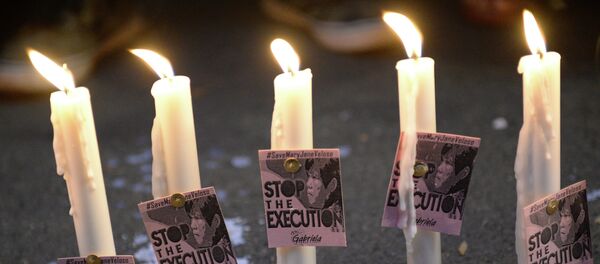However, it appears that it's no longer just money matters that members are interested in — for one particular EU member — it's a matter of life and death.
Hungary, which is part of the group of EU countries referred to as the 'accession countries' that joined the EU after 2004, has called for the reintroduction of the death penalty.
As EU refuses to penalize Hungary's misconduct, PM Orban wants to reintroduce death penalty. http://t.co/E4dnu8tazd pic.twitter.com/R7XIR5AVjb
— Kenneth Roth (@KenRoth) April 29, 2015
Viktor Orban believes penalties for serious crimes were too lenient and that capital punishment should be "kept on the agenda" in Hungary. In response, Austrian MEP Joerg Leichtfried said the return of the death penalty would be "barbaric".
Is Orban really proposing to bring back death penalty in Hungary? Shooting, hanging. gas, garrotte — what is his preferred method?
— Denis MacShane (@DenisMacShane) April 29, 2015
In response to Orban, European Union chief executive Jean Claude Juncker demanded that the Hungarian Prime Minister drop his suggestion that the country might reintroduce capital punishment. Juncker told reporters that the European Union's fundamental charter "forbids the death penalty" and that "Mr Orban must immediately make clear that this is not his intention. If it would be his intention, it would be a fight."
Hungary PM calls for death penalty debate "shocked" @VeraJourova. "The death penalty has no place in EU in the 21st century," says @CT24zive
— Bohumil Vostal (@BohumilVostal) April 30, 2015
The comments from Viktor Orban have been made at a particularly sensitive time and reveal a growing gap in ideals and shared policies amongst the accession countries and older EU members.
A French citizen, who faced death for drug trafficking by a firing squad in Indonesia, has been given a temporary reprieve. Eight other people weren't so lucky and were executed.
Speaking before the executions took place, EU President Donald Tusk said:
"The European Union is completely opposed to the death penalty."
French President Francois Hollande also said he would do "everything possible up to the last moment" to prevent the death of the French citizen in Indonesia, as "abolishing the death penalty is for us [in France] an absolute principle."
EU warns Orban to drop talk of death penalty http://t.co/s7hZTaBovs #EUwatch pic.twitter.com/w2wEvVReDX
— EUwatch Info Hub (@EUWatchers) April 30, 2015
Meanwhile, Nils Muiznieks, the human rights commissioner of the Council of Europe has also expressed concern over "the populist trend in political discourse in Hungary" in connection with Prime Minister Viktor Orban's recent remarks on the death penalty and other subjects.
"The idea of reintroducing the death penalty which has been raised by Prime Minister Orban is incompatible with Hungary's obligations under the European Convention on Human Rights, and runs contrary to the values that Europe stands for."
Guy Verhofstadt, head of the European Parliament's liberal group, called on the European People's Party to withdraw support for Orban.
The EPP, to which Orban's Fidesz party belongs, tweeted:
Death penalty is against EPP values and EU treaties. This is non-negotiable
— EPP (@EPP) April 29, 2015



